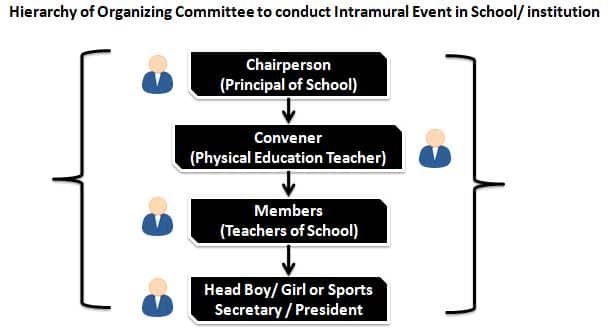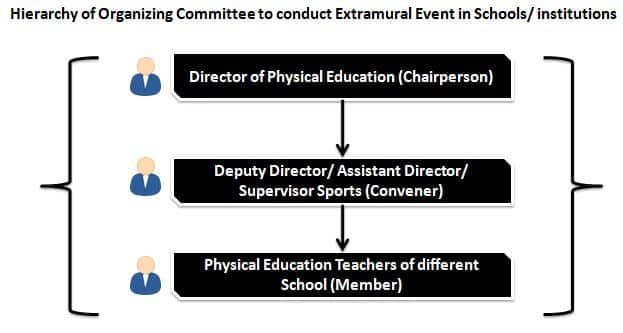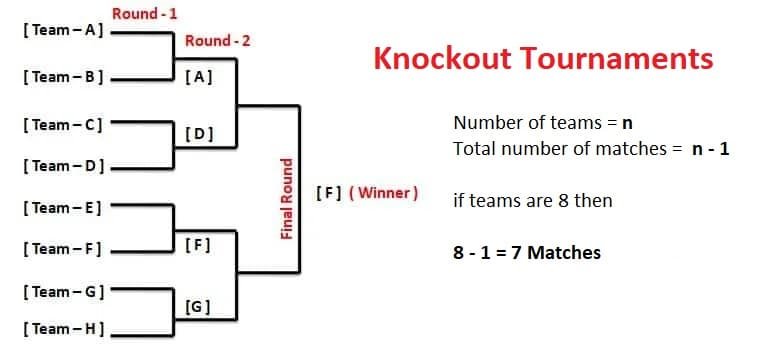Management of Sporting Events Class 12 Notes, This post provides detailed Class 12 Physical Education notes on Management of Sporting Events, aligned with the latest CBSE syllabus.
Management of Sporting Events Class 12 Notes
What is Sports Events Management?
Sports event management involves planning, organising, and executing sport-related events and activities. The sports event manager works hard at every level to make sure that events run smoothly.
Functions of Management –
- Planning: Planning is the process of creating a strategy to achieve goals, address issues, and enable action.
- Organising: The organising role includes making arrangements for hospitality management, including lodging, food and drink, hostesses, etc.
- Staffing: The process of selecting qualified candidates for managing the particular event is known as staffing.
- Directing: Providing leadership, supervision, and motivation to ensure tasks are completed efficiently.
- Controlling: Monitoring performance, identifying errors and how to implement correct actions to maintain standards.
Formation of Committees
To organise any sporting event, multiple committees can be formed. These committees will be based on the top, medium and lower levels of management. People can be selected for these committees based on the sport’s level and location. The hierarchy of the organising committee is given below:



What do you mean by organization committee?
The organising committee is known as OC; it is the group of individuals which manages and organises the event. This committee involve different aspects such as planning, finances, logistics, technical arrangment and marketing.
Various Committees & their Responsibilities
There are 4 committees under an organization committee.
- Technical Committee: Handles technical-related work like equipment purchases, timely completion of the event and managing sports officials.
- Finance Committee: These committees handle sponsorships, expenses related to the event and budgeting.
- Marketing Committee: This committee promotes the event, manages media presence and attracts sponsors.
- Logistics Committee: This committee organises transportation, venue arrangement, accommodation, and event ceremonies.
What is fixtures in sports?
A fixture refers to the structured schedule of matches, which deals with how the tournament players will compete with each other. It also deals with the match pairings, particular data, time and location.
Types of Fixtures in Sports Tournaments
Knock-Out (Bye & Seeding)
A knockout tournament is a type of competition where the teams or players are eliminated after losing a match, and the winning team will continue in the competition. This will continue until a champion is determined.

a. Bye in Knock-Out Tournaments
A bye in knockout means that the team will go to the next round without playing a match; it happens when the total number of teams is not a power of 2 (e.g., 3, 5, 6, 9, etc.). Let’s see one example.
Number of Byes = 2 x – n
Note: n = total number of teams, x = the smallest power of 2 that is greater than or equal to n.
For example,
Suppose there are 7 teams.
7 is not a power of 2, so we need to find the nearest power of 2 that is greater than or equal to 7.
Number of Byes = 2x – n
= 8 – 7
= 1
So, 1 team gets a bye in the first round.
b. Seeding in Knock-Out Tournaments
Seeding helps to ensure that the stronger teams won’t face each other at the tournament’s opening, which helps to maintain competitiveness and fairness.
League Tournament
A league tournament is also known as a round-robin tournament. A league tournament ensures that every team plays against all other teams at least once. In league tournaments teams earn points based on their performance; the highest scoring team will win the match.
For example,
- Suppose there are 8 team
- Every team plays against each other once.

For 8 teams:

Common Fixture Methods
- Cyclic Method – In the Cycle Method, one team stays in a fixed position, and other teams rotate to complete the match cycle.
- Staircase Method – Matches are arranged step-by-step in a structured sequence; the first team plays against each of the others, followed by the second team, and so on.
What is intramural tournaments?
The term “intramural” means “within the walls”. Intramural tournaments are the competition inside the school, college or community; here, no team will participate from outside of the organisation.
Objectives of Intramural Tournaments
- To encourage mass participation in sports in an institution.
- To focus on all-round development of children.
- To develop values like fair play, respect, friendship through sports.
- To provide first opportunity to compete in a controlled environment.
- To focus on fitness, wellness and health aspects of children.
- To promote curricular integration through sports.
- To help children to develop personality (first stage of leadership, control of emotions, corporation etc.)
What is Extramural Tournaments?
The word ‘extramural’ means “outside the boundary or walls”. Extramural tournaments are competitions that take place outside of the school, college, or institution. Extramural tournaments involve multiple teams from different institutions.
Objectives of Extramural Tournaments
- To achieve high performance at highest level of the tournament.
- To develop the feeling of integration with other institutions
- To provide opportunities for choosing a career in sports
- To promote social, cultural, economic development through sports.
Community Sports
Community sports play an important role in bringing people together and promoting fitness. Community sports events can be conducted in schools, cities, villages, or residential societies; any age group of people can participate in this type of event, including differently-abled individuals.
1. Sports Day
Annual sports days are the most important programmes in schools and residential areas. This event not only showcases the abilities and progress of children and youth, but it also gives an opportunity for community members to meet. The Government of India is also celebrating National Sports Day on 29th August, on the birth anniversary of Major Dhyan Chand, a hockey legend.
2. Health Run
Health Run focuses on health awareness rather than competition. This can be short-distance runs, making it accessible to everyone. This event is organised by an NGO, health department, or community. For example, fitness runs for World Health Day.
3. Run for Fun
Run for Fun is a friendly sports event which promotes fitness with enjoyment among all age groups. The goal of Run for Fun is to make the people fit and healthy and promote social bonding among them.
4. Run for a Specific Cause
These events generally spread awareness about social issues like cleanliness, environmental protection, cancer awareness, etc. For example, Run of Green Earth.
5. Run for Unity
The purpose of Run for Unity is to promote the feeling of integrity and brotherhood in community, state, nation or among different religions. For example, Run for National Integration.
6. Traditional Games & Sports
The purpose of this event is to preserve the cultural heritage of a nation. For example, Kho-Kho, Kabaddi, etc.
Physical Education Class 12 Notes
- Management of Sporting Events Class 12 Notes
- Physical Education Class 12 Chapter 2 Notes
- Physical Education Class 12 Chapter 3 Notes
- Physical Education Class 12 Chapter 4 Notes
- Sports and Nutrition Class 12 Notes
- Test and Measurement in Sports Class 12 Notes
- Physiology and Injuries in Sports Class 12 Notes
- Biomechanics and Sports Class 12 Notes
- Psychology and Sports Class 12 Notes
- Training in Sports Class 12 Notes
Physical Education Class 12 Questions and Answers
- Physical Education Class 12 Chapter 1 MCQ Solutions
- Physical Education Class 12 Chapter 2 Question Answers
- Physical Education Class 12 Chapter 3 Question Answers
- Physical Education and Sports for CWSN Class 12 Questions and Answers
- Sports and Nutrition Class 12 Questions and Answers
- Physical Education Class 12 Chapter 6 Question Answers
- Physiology and Injuries in Sports Class 12 Questions and Answers
- Biomechanics and Sports Class 12 Questions and Answers
- Psychology and Sports Class 12 Questions and Answers
- Training in Sports Class 12 Questions and Answers
Disclaimer: We have taken an effort to provide you with the accurate handout of “Management of Sporting Events Class 12 Notes“. If you feel that there is any error or mistake, please contact me at anuraganand2017@gmail.com. The above CBSE study material present on our websites is for education purpose, not our copyrights. All the above content and Screenshot are taken from Physical Eduction Class 12 NCERT Textbook, CBSE Sample Paper, CBSE Old Sample Paper, CBSE Board Paper and CBSE Support Material which is present in CBSEACADEMIC website, NCERT websiteThis Textbook and Support Material are legally copyright by Central Board of Secondary Education. We are only providing a medium and helping the students to improve the performances in the examination.
Images and content shown above are the property of individual organizations and are used here for reference purposes only.
For more information, refer to the official CBSE textbooks available at cbseacademic.nic.in
